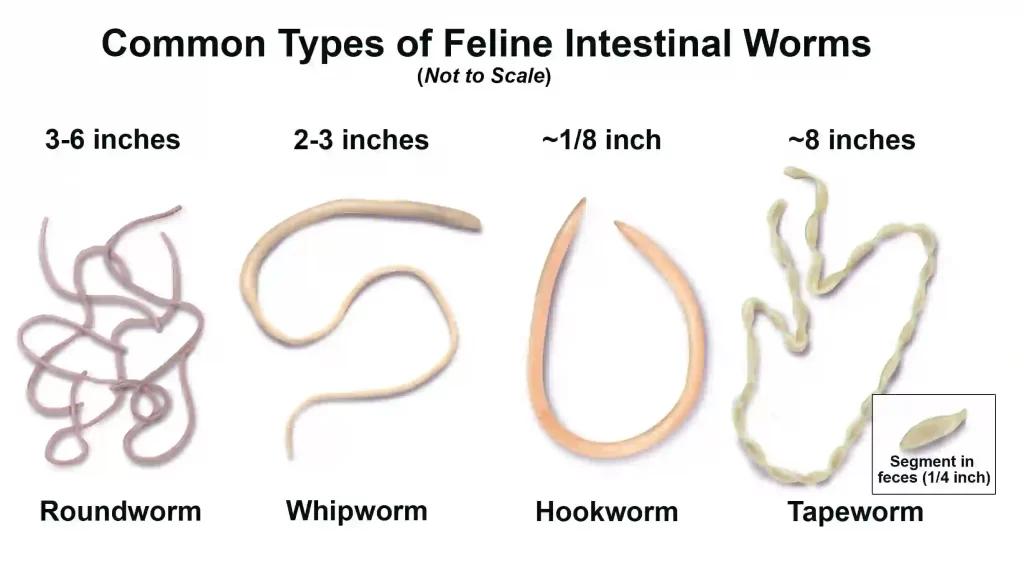How To Deworm A Cat? The Most Effective Methods!
Did you know that the most common parasites in cats are roundworms and tapeworms?
There are many types of worms parasites (For example roundworms and hookworms) that affect cats.
A fecal test will usually reveal whether your cat has parasites.
Internal parasites can live in the intestines, stomach, liver, heart and lungs.
Feline intestinal worms are common and can be detected in feline feces.
External parasites, on the other hand, settle on the skin of cats rather than inside their bodies.
Parasites can manifest themselves in many different ways.
For this reason, it is necessary to carefully observe the symptoms and make the necessary intervention.

What Will We Learn?
How to Identify Parasites in Cats?
Internal parasite problems in cats cause the cat to be used as a host and accordingly the cat to experience various health problems.
Parasites need a host, that is, a living organism, to continue their life cycle.
Parasites can live on cats, that is, on their skin or inside their bodies.
This can have consequences that threaten the health and even life of cats.
Parasites can survive in any place for a certain period of time.
Places, where parasites live temporarily, are called intermediate hosts.
Intermediate host is a means of transportation for the permanent host, that is, the host where the life cycle can be continued for a long time.
For this reason, environmental factors must be taken into account when trying to understand whether there is a parasite problem in cats.
Situations such as consuming contaminated water or food, contact with infected animals, being bitten by ticks or mosquitoes, or infecting themselves with parasites as a result of their activities while spending time outside should be considered.
If there are signs of the presence of parasites in cats and there is a high probability that the cats are in the situations just mentioned, the situation assessment should be made with all these data in mind.
See also: If you have gas, you can try Espumisan medicine.
What Are the Symptoms of Parasites in Cats?
Parasite symptoms in cats can be examined in two main categories. Symptoms of external parasites in cats and internal parasites in cats may differ.
Symptoms of external parasites in cats:
- Problems with skin and hair health,
- Weakened feathers,
- Alopecia (hair loss)
- Ears with a dirty appearance,
- Crusting in the form of black or red dots on the ears,
- Irritated skin,
- Skin lesions,
- It can be expressed as problems such as constant itching that can be caused by parasites that reside on the cat’s skin. Of course, it should not be forgotten that external parasites can cause other disorders in addition to these symptoms. The flea, which is one of the most common external parasites in cats, is the intermediate host of the tapeworm, which is one of the internal parasites that causes serious health problems for cats. For this reason, it is possible that internal parasite problems may occur in the continuation of the external parasite problem in cats.
See also: Sockit gel used after tooth extraction
Symptoms of internal parasites in cats:
- Anorexia,
- Increased appetite,
- Intense cleaning behavior of the anus and its surroundings,
- Weight loss despite normal diet
- Blood in stool,
- Abdominal pain,
- Diarrhea,
- Vomiting,
- Cough,
- Wheezing breathing,
- Difficulty in breathing,
- Slow heartbeat
- Matting of feathers,
- Bloating in the abdomen,
- It can be expressed as conditions such as fatigue.

How To Deworm A Cat?
Deworm a cat is a common ailment in cats and the veterinarian should determine how to treat.
Your veterinarian may prescribe Selamectin to treat deworming a cat.
The parasite can affect cats of all ages and breeds, including cats and kittens.
For the treatment of parasites in cats, the problem must first be clearly diagnosed.
Finding out which parasite the cat is having trouble with is the first step.
The treatment of internal parasites in cats and the treatment of external parasites in cats are different.
Treatment of external parasites in cats: External parasite infections in cats are planned depending on the severity of the parasite infestation.
Generally, oral medications or tropical applications are widely preferred in the treatment of external parasites.
Treatment of internal parasites in cats: If internal parasites occur in cats, treatment is planned using oral medications.
Internal parasites can be treated with regular use of drugs in paste, tablet, powder or syrup form.
Treatment planning for heartworm, which is seen in cats and is very difficult to treat, can be much more detailed.
Heartworm treatment may require self-administration.
In addition, if there is an anemia problem due to internal parasites, blood transfusion may be required to solve it.
Trying natural methods for the treatment of parasites in cats can cause the cat to wear out and experience greater health problems. Internal parasites in cats are not a health problem that can be treated with natural methods.
In the treatment of external parasites in cats, in some cases, the parasites that stay on the cat’s hair should be cleaned.
How to clean this cat parasite raises the question.
If cats have ectoparasites for which treatment is planned, it may be necessary to clean the parasites with special combs and prevent the cats from finding another intermediate host in the habitat.
These parasites should be cleaned with special combs and brushes, if necessary, with special solutions.
If you have nail fungus and it bothers you, you can try exoderil cream.

Are Parasites in Cats Transmitted to Humans?
One of the questions that many cat owners wonder is can parasites in cats pass to humans?
There are some parasites that can be passed from cats to humans.
Parasites such as hookworms, some tapeworms, toxoplasma can be transmitted from cats to humans.
However, it is possible to prevent this transition by paying attention to hygiene and contact.
Studies have shown that many parasites in cats are not transmitted to humans.
Some of the flea and scabies species are external parasites that can pass from cats to humans.
However, it is possible to prevent their transmission to humans.
Also, since fleas are the intermediate host of the tapeworm, an internal parasite, it is possible for humans to develop tapeworms as a result of accidental ingestion of fleas in cats, but this is not common.
Did you know that tapeworms are a flea larvae?
Worms in cat stool can be seen. This is an indication that the treatment is going well.
Additionally, you can have your cat do a fecal exam.
If you see parasites in your cat, you can use dewormer medication.
Your cat can get parasites from another cat’s infected feces.
If you see parasites such as a grain of white rice in your cat’s stool, do not worry and contact the animal hospital immediately.
To prevent parasites, thoroughly wash the cat’s litter boxes and clean them when the time comes.
In short, this ailment can be seen in adult cats or kittens.
Selamectin medication can be used to treat cat worm, but you should not give this medication if your cat is 8 weeks of age or less
Feline intestinal worms are common and can be detected in feline feces.
